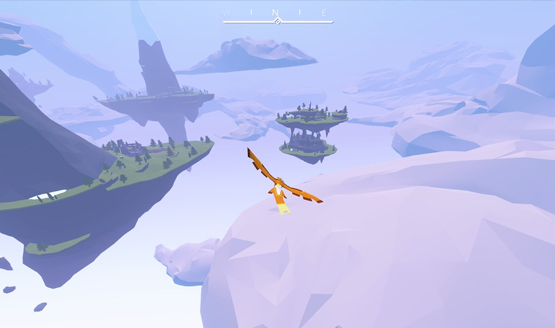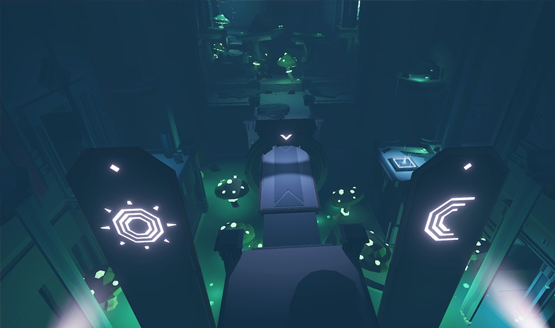
If video games allow us to embrace the deepest parts of our imaginations, then AER is the game that lets players fly free. How many times, despite my almost irrational fear of heights, have I wished that I could simply leap from the edge of a precipice only to be held aloft on wings, soaring through the air as effortlessly as breathing? The inevitability of a stylized indie game in this era of gaming is that it will be compared to thatgamecompany’s exploration heavy titles like Journey, or even other artistic indie games that followed in Journey’s footsteps such as Abzu. AER is in good company then, but it takes more than good looks to break out of the comparison and end up defined as a great game to its own credit.
The stunning high resolution, low-poly art style is unique, almost making the painted visuals look like they were molded from clay. It’s as if developer Daedalic Entertainment took 64-bit polygonal models from the PS1 and Nintendo 64 era and smoothed them over, making them fit into the modern high-definition world. The result is something that doesn’t sound like it would work on paper, but is quite impressive in execution.
After I toned down the camera sensitivity (seriously, the camera in AER is far and away the touchiest I’ve ever dealt with), I set off exploring the cave I started in as Auk, a girl on a sacred pilgrimage through a world of islands that float in midair. Starting grounded allows a sense of the mystery of the world to seep in, and makes taking to the skies that much more enjoyable when I finally ended up taking my first leap from the floating plot of land.
For a few moments, I was free falling. You see, people can’t fly, which is why Auk’s ability to become a bird comes in handy here in this world of islands connected only by air currents. Shifting to a feathered figure with wings gave me the sky as a playground, in some of the smoothest flight mechanics in any game I’ve played. It’s incredibly satisfying to whip through clouds and past mountain peaks, shifting back into human form for a few brief moments to let physics take hold, and then transforming to a bird once more to continue my journey. I imagine it’s the same kind of playful nature I myself would have with the air if I had this same ability. The best comparison I can make is the magic carpet ride during “A Whole New World” on Aladdin. Daedalic captured this feeling in the best way possible without actually launching their players through the open air.
No Purpose, No Direction
After some time of flying around though, I realized I had no idea what I was supposed to be doing. I suppose I could have paid better attention to the old man’s dialog at the mouth of the cave and gone where I was directed, but I got so caught up in flight that I lost any kind of direction. It took some time before I finally made my way back to a small village and found the person I was supposed to be talking to. It’s a problem that permeates AER. It never tells you directly where you need to go, and the desire to soar and explore is rarely connected to the text heavy and linear story. I hate to bring back the comparison, but by being more linear in execution, Journey was able to tell a story through gameplay without the use of words at all. AER tells a deep and interesting story that is chained to exposition when compared to the free flowing nature of the flight gameplay.
Soaring through the skies can also make the temples Auk visits seem like a chore to run, jump, and climb through. Her ability to become a bird is gone in these caverns, so there’s a sheer difference in gameplay that doesn’t do a great job driving the desire to go into one. It’s not just the caverns that run into this issue though. AER is littered with islands that the gaming side of my brain told me would be filled with secrets, collectibles, and Easter eggs. After landing on a few and not finding much, I resigned myself to remain aloft. AER’s reasons to explore the environment are as thin as the air I was traveling through, which makes one wonder what the point is when there’s no combat. No enemies to fight means exploration and discovery is the key, but without much to discover in exploration, AER becomes a bird flight simulator with a number of text-based expositions about the old gods and the state of the world.
It should be said that the music in AER is just as fantastic as the visuals, something that these artful indies seem to be great at crafting. The look and feel of the world through both visuals and sound has a unique depth, achieving booming low, dark points, and crystalline high, airy points. Each environment, from the deepest caves to punching right through the middle of a sunlit cloud, is accented by both the art style and the music that encapsulates each moment. While it may stumble in telling its story and giving players strong reasons for exploration, it succeeds in creating stunning contrast in the world.
At its core, I understand what AER: Memories of Old was trying to do. AER has a deep story to tell and it has a beautiful way that it wants to do it, but it never manages to marry those ideas. Wanton exploration with little-to-no real payoff becomes a chore—a beautiful chore sure, but a chore nonetheless. There are only so many times I can shift back and forth between bird and human midair before I need something else to drive my engagement. Telling the story through environment, providing better direction, and rewarding extensive exploration are just a few things that could have really helped AER to escape the high res, low poly shell that it is, but AER: Memories of Old is simply too empty to feel like anything more.
AER review code provided by publisher. Version 1.00 reviewed on a standard PS4. For more information on review scores, please read our Review Policy.
-
Gorgeous high res, low poly visuals
-
Smooth and imagination-igniting flight mechanics
-
Free exploration and linear story never feel cohesive
-
Empty world gives very little reward for active exploration
-
Poor guidance for players who want to know what to do next







